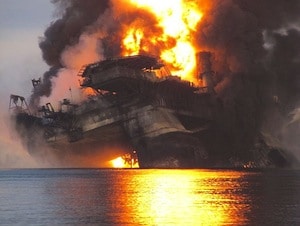A new report released by authorities in the Marshall Islands says that the failure of oil rig workers to properly address safety issues led to last year’s catastrophic blowout and explosion of the Deepwater Horizon oil rig. The Deepwater Horizon was registered in the Marshall Islands by rig owner Transocean. Much like large ships, oil rigs are often registered in overseas territories for tax purposes.
The Marshall Islands report is one of the first to explicitly put the blame for the disaster on workers rather than the companies involved – BP, Transocean, Halliburton, and Cameron International. While the new report is not the first to claim that communications broke down in the moments leading up to the Deepwater Horizon explosion, it is the first to place the blame mostly on the backs of the people who did everything in their power to avert the disaster, while only casually mentioning the fact that BP’s actions and those of the other companies with a stake in the rig might have also helped cause the disaster.
From The Star Tribune:
In somewhat of a pass for Transocean, the report concluded that confusion regarding decision-making authority during the incident was not a cause of the disaster.
The report also recommended rig operators ensure that new crew members, contractors and visitors be told when they board about the roles and responsibilities of people in charge of the vessel, and how the chain of command works in emergencies.
The report also makes the claim that the oil rig was completely fit for service during the time of the explosion. This claim is contrary to previous reports that Halliburton’s cement mixture was substandard, that BP cut corners on rig safety to save money and forged inspection documents, and that the design of the blowout preventer made the device utterly worthless.
An investigation this past April also revealed that the Marshall Islands had failed in their duties to inspect the vessel, which could have potentially implicated the nation in the spate of lawsuits surrounding the Deepwater Horizon explosion and subsequent oil leak into the Gulf of Mexico.
This report is similar to a report released earlier this year by investigators at Transocean. The Transocean internal report placed the blame squarely on the backs of both BP and Halliburon for a mix of failures, but also claimed that their rig was fit for duty.
What the report ultimately does is vindicate rig owner Transocean from any wrongdoing in the matter. It also protects the Marshall Islands’ stake in offshore drilling vessel registrations.
As mentioned above, oil rigs are usually registered overseas to help cut down on tax liabilities. Transocean, a company based in Sweden, owns roughly 50% of all deepwater rigs in existence, with countless rigs registered in the Marshall Islands. So the Marshall Islands has a deep interest in making sure that Transocean remains free of blame in the matter – they have a lot to gain financially from the company.
However, a report by the U.S. Coast Guard shows that the two entities might be the ones responsible for the command breakdown that they are now blaming for the disaster. From the Coast Guard’s report:
Because of a ‘clerical error,’ by the Republic of the Marshall Islands, DEEPWATER HORIZON, was classified in a manner that permitted it to have a dual-command organizational structure under which the OIM was in charge when the vessel was latched on to the well, but the master was in charge when the MODU was underway between locations or in an emergency situation. When the explosions began, however, there was no immediate transfer of authority from the OIM to the master, and the master asked permission from the OIM to the master, and the master asked permission from the OIM to activate the vessel’s EDS. This command confusion at a critical point in the emergency may have impacted the decision to activate the EDS.”
The Republic of the Marshall Islands’ (RMI’) “clerical error” in listing DEEPWATER HORIZON as a self-propelled MODU instead of a dynamic positioned vessel enabled Transocean to implement a dual-command organizational structure on board the vessel. This arrangement may have impacted the decision to activate the vessel’s emergency disconnect system (EDS). Even though the master, who was responsible for the safety of his vessel, was in the CCR at the time of the well blowout, it cannot be conclusively determined whether his questionable reaction was due to his indecisiveness, a lack of training on how to activate the EDS or the failure to properly execute an emergency transfer of authority as required by the vessel’s operations manual. U.S. regulations do not address whether the master or OIM has the ultimate authority onboard foreign registered dynamic positioned MODUs operating on the U.S. Outer Continental Shelf.”
In essence, by blaming the crew and the breakdown in the chain of command in the run up to the explosion, both Transocean and the Marshall Islands are actually blaming themselves.
So far, every corporate entity involved in the Gulf oil disaster has attempted to put the blame onto someone else. And as long as oil continues to roll up onto our shores, it is unlikely that the blame game will end.
Subscribe to our newsletter
Stay up to date with DeSmog news and alerts






